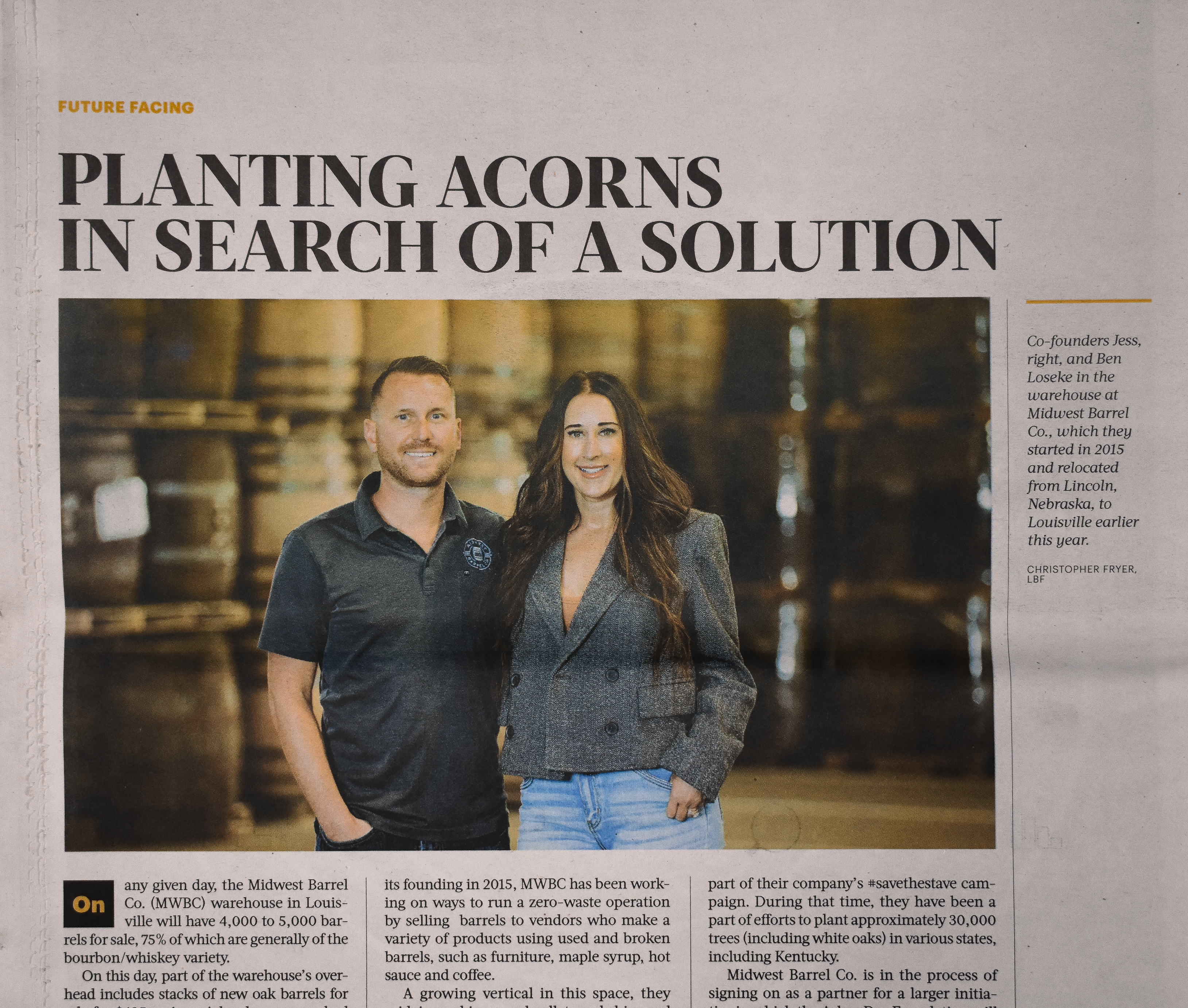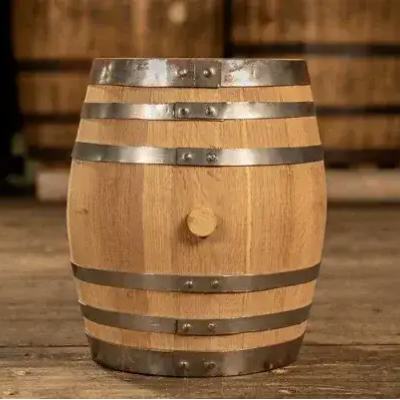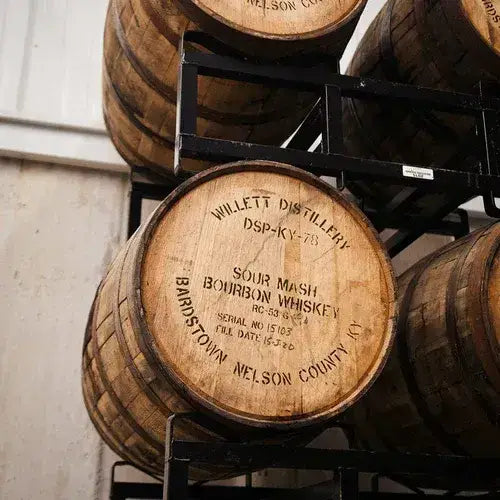Buffalo Trace Rye Whiskey & Willett Rye Whiskey Barrels NOT included
{"uuid":"04b93b56-241c-496e-9630-bdca35f08fcb","config":{"selected_countries_config":[],"show_progress_bar_in":["cart","product_page"],"style":{"--reward-font-size":"12px","--message-font-size":"18px","--progress-bar-height":"6px","--progress-bar-radius":"6px","--card-border-width":"1px","--card-border-radius":"0px","--card-background-color":"rgba(51, 51, 51, 0)","--card-border-color":"rgba(51, 51, 51, 0)","--message-text-color":"rgb(51, 51, 51)","--reward-text-color":"rgb(51, 51, 51)","--progress-bar-empty-color":"rgba(228, 228, 228, 1)","--progress-bar-full-color":"rgb(65, 211, 138)","--font-family":"inherit"}},"rewards":[{"goal_amount":4,"discount_amount":50,"discount_type":"fixed_amount","unfulfilled_goal_text":"Add {{amount_left}} to get $50 OFF!","order":7232,"discount_text":"Buffalo Trace Rye Whiskey \u0026 Willett Rye Whiskey Barrels NOT included"}],"shop":{"currency":"USD","money_format":"${{amount}}","development_store":false,"subscription_active":false},"excluded_variant_ids":[{"id":"gid:\/\/shopify\/ProductVariant\/51627473600672"},{"id":"gid:\/\/shopify\/ProductVariant\/40964941840544"},{"id":"gid:\/\/shopify\/ProductVariant\/41016100651168"},{"id":"gid:\/\/shopify\/ProductVariant\/41016090296480"},{"id":"gid:\/\/shopify\/ProductVariant\/40495488499872"},{"id":"gid:\/\/shopify\/ProductVariant\/40495490171040"},{"id":"gid:\/\/shopify\/ProductVariant\/40495490105504"},{"id":"gid:\/\/shopify\/ProductVariant\/42686189994144"},{"id":"gid:\/\/shopify\/ProductVariant\/41375972688032"},{"id":"gid:\/\/shopify\/ProductVariant\/41509689131168"},{"id":"gid:\/\/shopify\/ProductVariant\/40287926714528"},{"id":"gid:\/\/shopify\/ProductVariant\/40916923646112"},{"id":"gid:\/\/shopify\/ProductVariant\/41599286476960"},{"id":"gid:\/\/shopify\/ProductVariant\/40916935180448"},{"id":"gid:\/\/shopify\/ProductVariant\/41307124531360"},{"id":"gid:\/\/shopify\/ProductVariant\/40523260133536"},{"id":"gid:\/\/shopify\/ProductVariant\/61352688583026"},{"id":"gid:\/\/shopify\/ProductVariant\/45617931714720"},{"id":"gid:\/\/shopify\/ProductVariant\/40916940030112"},{"id":"gid:\/\/shopify\/ProductVariant\/40287283544224"},{"id":"gid:\/\/shopify\/ProductVariant\/41752139301024"},{"id":"gid:\/\/shopify\/ProductVariant\/40495488073888"},{"id":"gid:\/\/shopify\/ProductVariant\/40495492792480"},{"id":"gid:\/\/shopify\/ProductVariant\/40468723761312"},{"id":"gid:\/\/shopify\/ProductVariant\/41422551449760"},{"id":"gid:\/\/shopify\/ProductVariant\/52489263710578"},{"id":"gid:\/\/shopify\/ProductVariant\/40287932842144"},{"id":"gid:\/\/shopify\/ProductVariant\/40495488860320"},{"id":"gid:\/\/shopify\/ProductVariant\/40539894087840"},{"id":"gid:\/\/shopify\/ProductVariant\/40539887894688"},{"id":"gid:\/\/shopify\/ProductVariant\/40495489876128"},{"id":"gid:\/\/shopify\/ProductVariant\/40495489908896"},{"id":"gid:\/\/shopify\/ProductVariant\/40495489810592"},{"id":"gid:\/\/shopify\/ProductVariant\/40495489941664"},{"id":"gid:\/\/shopify\/ProductVariant\/40539884519584"},{"id":"gid:\/\/shopify\/ProductVariant\/40913461412000"},{"id":"gid:\/\/shopify\/ProductVariant\/40495488532640"},{"id":"gid:\/\/shopify\/ProductVariant\/41163965431968"},{"id":"gid:\/\/shopify\/ProductVariant\/40495492563104"},{"id":"gid:\/\/shopify\/ProductVariant\/40495488204960"},{"id":"gid:\/\/shopify\/ProductVariant\/47027057688736"},{"id":"gid:\/\/shopify\/ProductVariant\/40495488598176"},{"id":"gid:\/\/shopify\/ProductVariant\/47463919780000"},{"id":"gid:\/\/shopify\/ProductVariant\/41052418670752"},{"id":"gid:\/\/shopify\/ProductVariant\/41052451373216"},{"id":"gid:\/\/shopify\/ProductVariant\/41376505200800"},{"id":"gid:\/\/shopify\/ProductVariant\/41164249727136"},{"id":"gid:\/\/shopify\/ProductVariant\/41164226298016"},{"id":"gid:\/\/shopify\/ProductVariant\/40539900510368"},{"id":"gid:\/\/shopify\/ProductVariant\/45196746293408"},{"id":"gid:\/\/shopify\/ProductVariant\/40495490007200"},{"id":"gid:\/\/shopify\/ProductVariant\/40495488434336"},{"id":"gid:\/\/shopify\/ProductVariant\/40495490138272"},{"id":"gid:\/\/shopify\/ProductVariant\/40287914131616"},{"id":"gid:\/\/shopify\/ProductVariant\/40495492726944"},{"id":"gid:\/\/shopify\/ProductVariant\/40495488663712"},{"id":"gid:\/\/shopify\/ProductVariant\/48899157328032"},{"id":"gid:\/\/shopify\/ProductVariant\/60673606287730"},{"id":"gid:\/\/shopify\/ProductVariant\/60673606320498"},{"id":"gid:\/\/shopify\/ProductVariant\/46053278711968"},{"id":"gid:\/\/shopify\/ProductVariant\/51655138771314"},{"id":"gid:\/\/shopify\/ProductVariant\/42846946787488"},{"id":"gid:\/\/shopify\/ProductVariant\/52527781347698"},{"id":"gid:\/\/shopify\/ProductVariant\/52527783444850"},{"id":"gid:\/\/shopify\/ProductVariant\/52527790981490"},{"id":"gid:\/\/shopify\/ProductVariant\/52527789834610"},{"id":"gid:\/\/shopify\/ProductVariant\/52514942189938"},{"id":"gid:\/\/shopify\/ProductVariant\/40914610225312"},{"id":"gid:\/\/shopify\/ProductVariant\/52527948104050"},{"id":"gid:\/\/shopify\/ProductVariant\/52527947940210"},{"id":"gid:\/\/shopify\/ProductVariant\/52527947874674"},{"id":"gid:\/\/shopify\/ProductVariant\/48534470885536"},{"id":"gid:\/\/shopify\/ProductVariant\/40495493021856"},{"id":"gid:\/\/shopify\/ProductVariant\/52348649603442"},{"id":"gid:\/\/shopify\/ProductVariant\/52348649636210"},{"id":"gid:\/\/shopify\/ProductVariant\/52348649668978"},{"id":"gid:\/\/shopify\/ProductVariant\/52348649734514"},{"id":"gid:\/\/shopify\/ProductVariant\/52348649865586"},{"id":"gid:\/\/shopify\/ProductVariant\/52348649898354"},{"id":"gid:\/\/shopify\/ProductVariant\/52514942386546"},{"id":"gid:\/\/shopify\/ProductVariant\/40539918008480"},{"id":"gid:\/\/shopify\/ProductVariant\/40540020605088"},{"id":"gid:\/\/shopify\/ProductVariant\/40539663827104"},{"id":"gid:\/\/shopify\/ProductVariant\/52514942157170"},{"id":"gid:\/\/shopify\/ProductVariant\/50205630529696"},{"id":"gid:\/\/shopify\/ProductVariant\/40287057641632"},{"id":"gid:\/\/shopify\/ProductVariant\/52514942452082"},{"id":"gid:\/\/shopify\/ProductVariant\/40287819169952"},{"id":"gid:\/\/shopify\/ProductVariant\/40495487877280"},{"id":"gid:\/\/shopify\/ProductVariant\/40523265179808"},{"id":"gid:\/\/shopify\/ProductVariant\/43757780369568"},{"id":"gid:\/\/shopify\/ProductVariant\/43757704577184"},{"id":"gid:\/\/shopify\/ProductVariant\/40913405313184"},{"id":"gid:\/\/shopify\/ProductVariant\/40287688622240"},{"id":"gid:\/\/shopify\/ProductVariant\/40539656552608"},{"id":"gid:\/\/shopify\/ProductVariant\/40539659698336"},{"id":"gid:\/\/shopify\/ProductVariant\/40495487746208"},{"id":"gid:\/\/shopify\/ProductVariant\/40287745474720"},{"id":"gid:\/\/shopify\/ProductVariant\/48496344531104"},{"id":"gid:\/\/shopify\/ProductVariant\/48496344563872"},{"id":"gid:\/\/shopify\/ProductVariant\/40495488794784"},{"id":"gid:\/\/shopify\/ProductVariant\/43036822405280"},{"id":"gid:\/\/shopify\/ProductVariant\/41163842879648"},{"id":"gid:\/\/shopify\/ProductVariant\/40913402396832"},{"id":"gid:\/\/shopify\/ProductVariant\/40495492890784"},{"id":"gid:\/\/shopify\/ProductVariant\/52348560834930"},{"id":"gid:\/\/shopify\/ProductVariant\/52348560867698"},{"id":"gid:\/\/shopify\/ProductVariant\/52348560900466"},{"id":"gid:\/\/shopify\/ProductVariant\/52348561097074"},{"id":"gid:\/\/shopify\/ProductVariant\/52348561129842"},{"id":"gid:\/\/shopify\/ProductVariant\/52348561162610"},{"id":"gid:\/\/shopify\/ProductVariant\/52348561228146"},{"id":"gid:\/\/shopify\/ProductVariant\/52348560966002"},{"id":"gid:\/\/shopify\/ProductVariant\/52348560998770"},{"id":"gid:\/\/shopify\/ProductVariant\/52348561031538"},{"id":"gid:\/\/shopify\/ProductVariant\/52348561260914"},{"id":"gid:\/\/shopify\/ProductVariant\/52348561293682"},{"id":"gid:\/\/shopify\/ProductVariant\/52348561326450"},{"id":"gid:\/\/shopify\/ProductVariant\/52348561391986"},{"id":"gid:\/\/shopify\/ProductVariant\/52348561457522"},{"id":"gid:\/\/shopify\/ProductVariant\/52348561490290"},{"id":"gid:\/\/shopify\/ProductVariant\/52348561719666"},{"id":"gid:\/\/shopify\/ProductVariant\/52348561752434"},{"id":"gid:\/\/shopify\/ProductVariant\/52348561785202"},{"id":"gid:\/\/shopify\/ProductVariant\/52348561817970"},{"id":"gid:\/\/shopify\/ProductVariant\/52348561588594"},{"id":"gid:\/\/shopify\/ProductVariant\/52348561621362"},{"id":"gid:\/\/shopify\/ProductVariant\/52348561654130"},{"id":"gid:\/\/shopify\/ProductVariant\/52348561850738"},{"id":"gid:\/\/shopify\/ProductVariant\/52348561883506"},{"id":"gid:\/\/shopify\/ProductVariant\/52348561916274"},{"id":"gid:\/\/shopify\/ProductVariant\/52348561981810"},{"id":"gid:\/\/shopify\/ProductVariant\/52348562014578"},{"id":"gid:\/\/shopify\/ProductVariant\/52348562047346"},{"id":"gid:\/\/shopify\/ProductVariant\/52348562243954"},{"id":"gid:\/\/shopify\/ProductVariant\/52348562276722"},{"id":"gid:\/\/shopify\/ProductVariant\/52348562407794"},{"id":"gid:\/\/shopify\/ProductVariant\/52348562538866"},{"id":"gid:\/\/shopify\/ProductVariant\/52348562112882"},{"id":"gid:\/\/shopify\/ProductVariant\/52348562145650"},{"id":"gid:\/\/shopify\/ProductVariant\/52348562178418"},{"id":"gid:\/\/shopify\/ProductVariant\/52348562571634"},{"id":"gid:\/\/shopify\/ProductVariant\/52348562604402"},{"id":"gid:\/\/shopify\/ProductVariant\/52348562637170"},{"id":"gid:\/\/shopify\/ProductVariant\/40495487811744"},{"id":"gid:\/\/shopify\/ProductVariant\/48203885805728"},{"id":"gid:\/\/shopify\/ProductVariant\/40306835292320"},{"id":"gid:\/\/shopify\/ProductVariant\/40307203342496"},{"id":"gid:\/\/shopify\/ProductVariant\/40523260559520"},{"id":"gid:\/\/shopify\/ProductVariant\/40315701362848"},{"id":"gid:\/\/shopify\/ProductVariant\/40495487680672"},{"id":"gid:\/\/shopify\/ProductVariant\/40495493185696"},{"id":"gid:\/\/shopify\/ProductVariant\/52514942321010"},{"id":"gid:\/\/shopify\/ProductVariant\/47476118028448"},{"id":"gid:\/\/shopify\/ProductVariant\/46975508218016"},{"id":"gid:\/\/shopify\/ProductVariant\/40495493054624"},{"id":"gid:\/\/shopify\/ProductVariant\/60787432587634"},{"id":"gid:\/\/shopify\/ProductVariant\/52514942255474"},{"id":"gid:\/\/shopify\/ProductVariant\/52514942353778"},{"id":"gid:\/\/shopify\/ProductVariant\/40917294153888"},{"id":"gid:\/\/shopify\/ProductVariant\/40495487713440"},{"id":"gid:\/\/shopify\/ProductVariant\/40914605605024"},{"id":"gid:\/\/shopify\/ProductVariant\/52514942222706"},{"id":"gid:\/\/shopify\/ProductVariant\/52514942288242"},{"id":"gid:\/\/shopify\/ProductVariant\/40523261214880"},{"id":"gid:\/\/shopify\/ProductVariant\/43551580815520"},{"id":"gid:\/\/shopify\/ProductVariant\/46433488240800"},{"id":"gid:\/\/shopify\/ProductVariant\/40523265540256"},{"id":"gid:\/\/shopify\/ProductVariant\/41163907956896"},{"id":"gid:\/\/shopify\/ProductVariant\/47186389401760"},{"id":"gid:\/\/shopify\/ProductVariant\/48889216696480"},{"id":"gid:\/\/shopify\/ProductVariant\/48889217155232"},{"id":"gid:\/\/shopify\/ProductVariant\/42785707851936"},{"id":"gid:\/\/shopify\/ProductVariant\/44909140082848"},{"id":"gid:\/\/shopify\/ProductVariant\/48534476816544"},{"id":"gid:\/\/shopify\/ProductVariant\/48534390735008"},{"id":"gid:\/\/shopify\/ProductVariant\/40495487942816"},{"id":"gid:\/\/shopify\/ProductVariant\/61386221420914"},{"id":"gid:\/\/shopify\/ProductVariant\/40523265605792"},{"id":"gid:\/\/shopify\/ProductVariant\/40495492825248"},{"id":"gid:\/\/shopify\/ProductVariant\/46946602287264"},{"id":"gid:\/\/shopify\/ProductVariant\/40495490400416"},{"id":"gid:\/\/shopify\/ProductVariant\/46942393663648"},{"id":"gid:\/\/shopify\/ProductVariant\/40495488762016"},{"id":"gid:\/\/shopify\/ProductVariant\/48534399287456"},{"id":"gid:\/\/shopify\/ProductVariant\/47644309291168"},{"id":"gid:\/\/shopify\/ProductVariant\/43036347498656"},{"id":"gid:\/\/shopify\/ProductVariant\/45196424052896"},{"id":"gid:\/\/shopify\/ProductVariant\/42785145847968"},{"id":"gid:\/\/shopify\/ProductVariant\/41584559358112"},{"id":"gid:\/\/shopify\/ProductVariant\/41584582525088"},{"id":"gid:\/\/shopify\/ProductVariant\/41588374634656"},{"id":"gid:\/\/shopify\/ProductVariant\/40495488106656"},{"id":"gid:\/\/shopify\/ProductVariant\/40913480810656"},{"id":"gid:\/\/shopify\/ProductVariant\/40495489253536"},{"id":"gid:\/\/shopify\/ProductVariant\/40495489777824"},{"id":"gid:\/\/shopify\/ProductVariant\/40495492661408"},{"id":"gid:\/\/shopify\/ProductVariant\/40495492497568"},{"id":"gid:\/\/shopify\/ProductVariant\/41742646739104"},{"id":"gid:\/\/shopify\/ProductVariant\/40468786380960"},{"id":"gid:\/\/shopify\/ProductVariant\/41163877875872"},{"id":"gid:\/\/shopify\/ProductVariant\/47260260860064"},{"id":"gid:\/\/shopify\/ProductVariant\/49482828578976"},{"id":"gid:\/\/shopify\/ProductVariant\/47046183026848"},{"id":"gid:\/\/shopify\/ProductVariant\/48889196970144"},{"id":"gid:\/\/shopify\/ProductVariant\/48899160080544"},{"id":"gid:\/\/shopify\/ProductVariant\/47123109019808"},{"id":"gid:\/\/shopify\/ProductVariant\/47044623106208"},{"id":"gid:\/\/shopify\/ProductVariant\/43036753199264"},{"id":"gid:\/\/shopify\/ProductVariant\/40495492530336"},{"id":"gid:\/\/shopify\/ProductVariant\/40495492628640"},{"id":"gid:\/\/shopify\/ProductVariant\/40495492595872"},{"id":"gid:\/\/shopify\/ProductVariant\/40495492104352"},{"id":"gid:\/\/shopify\/ProductVariant\/40495488991392"},{"id":"gid:\/\/shopify\/ProductVariant\/40495489056928"},{"id":"gid:\/\/shopify\/ProductVariant\/47018760339616"},{"id":"gid:\/\/shopify\/ProductVariant\/49157663621280"},{"id":"gid:\/\/shopify\/ProductVariant\/46937949667488"},{"id":"gid:\/\/shopify\/ProductVariant\/48534457548960"},{"id":"gid:\/\/shopify\/ProductVariant\/43036693299360"},{"id":"gid:\/\/shopify\/ProductVariant\/42395853389984"},{"id":"gid:\/\/shopify\/ProductVariant\/42395868496032"},{"id":"gid:\/\/shopify\/ProductVariant\/43627241144480"},{"id":"gid:\/\/shopify\/ProductVariant\/42785168621728"},{"id":"gid:\/\/shopify\/ProductVariant\/42785679835296"},{"id":"gid:\/\/shopify\/ProductVariant\/42785512161440"},{"id":"gid:\/\/shopify\/ProductVariant\/40495489089696"},{"id":"gid:\/\/shopify\/ProductVariant\/43123240108192"},{"id":"gid:\/\/shopify\/ProductVariant\/40495489286304"},{"id":"gid:\/\/shopify\/ProductVariant\/40495489319072"},{"id":"gid:\/\/shopify\/ProductVariant\/40913478516896"},{"id":"gid:\/\/shopify\/ProductVariant\/40913474879648"},{"id":"gid:\/\/shopify\/ProductVariant\/48984623251616"},{"id":"gid:\/\/shopify\/ProductVariant\/40495488139424"},{"id":"gid:\/\/shopify\/ProductVariant\/40495487254688"},{"id":"gid:\/\/shopify\/ProductVariant\/42922568417440"},{"id":"gid:\/\/shopify\/ProductVariant\/40539646263456"},{"id":"gid:\/\/shopify\/ProductVariant\/48984640290976"},{"id":"gid:\/\/shopify\/ProductVariant\/48984655495328"},{"id":"gid:\/\/shopify\/ProductVariant\/48984635900064"},{"id":"gid:\/\/shopify\/ProductVariant\/49313966784672"},{"id":"gid:\/\/shopify\/ProductVariant\/42459841298592"},{"id":"gid:\/\/shopify\/ProductVariant\/42846743986336"},{"id":"gid:\/\/shopify\/ProductVariant\/47019129962656"},{"id":"gid:\/\/shopify\/ProductVariant\/42545135681696"},{"id":"gid:\/\/shopify\/ProductVariant\/47272528117920"},{"id":"gid:\/\/shopify\/ProductVariant\/40495488172192"},{"id":"gid:\/\/shopify\/ProductVariant\/42785694122144"},{"id":"gid:\/\/shopify\/ProductVariant\/42785529528480"},{"id":"gid:\/\/shopify\/ProductVariant\/43123299483808"},{"id":"gid:\/\/shopify\/ProductVariant\/48534463512736"},{"id":"gid:\/\/shopify\/ProductVariant\/48971583520928"},{"id":"gid:\/\/shopify\/ProductVariant\/48971597217952"},{"id":"gid:\/\/shopify\/ProductVariant\/48534466789536"},{"id":"gid:\/\/shopify\/ProductVariant\/48534428319904"},{"id":"gid:\/\/shopify\/ProductVariant\/47027261636768"},{"id":"gid:\/\/shopify\/ProductVariant\/40495488958624"},{"id":"gid:\/\/shopify\/ProductVariant\/40495488893088"},{"id":"gid:\/\/shopify\/ProductVariant\/47026818875552"},{"id":"gid:\/\/shopify\/ProductVariant\/47027146752160"},{"id":"gid:\/\/shopify\/ProductVariant\/40495488925856"},{"id":"gid:\/\/shopify\/ProductVariant\/47272521236640"},{"id":"gid:\/\/shopify\/ProductVariant\/44909705101472"},{"id":"gid:\/\/shopify\/ProductVariant\/60714379936114"},{"id":"gid:\/\/shopify\/ProductVariant\/52541353132402"},{"id":"gid:\/\/shopify\/ProductVariant\/48534475079840"},{"id":"gid:\/\/shopify\/ProductVariant\/48984649990304"},{"id":"gid:\/\/shopify\/ProductVariant\/48984700944544"},{"id":"gid:\/\/shopify\/ProductVariant\/48984659558560"},{"id":"gid:\/\/shopify\/ProductVariant\/48889219121312"},{"id":"gid:\/\/shopify\/ProductVariant\/47644659908768"},{"id":"gid:\/\/shopify\/ProductVariant\/41164235866272"},{"id":"gid:\/\/shopify\/ProductVariant\/61101966492018"},{"id":"gid:\/\/shopify\/ProductVariant\/41477295702176"},{"id":"gid:\/\/shopify\/ProductVariant\/43123172606112"},{"id":"gid:\/\/shopify\/ProductVariant\/43123121520800"},{"id":"gid:\/\/shopify\/ProductVariant\/40913466654880"},{"id":"gid:\/\/shopify\/ProductVariant\/40495490072736"},{"id":"gid:\/\/shopify\/ProductVariant\/42705436999840"},{"id":"gid:\/\/shopify\/ProductVariant\/52555366465906"},{"id":"gid:\/\/shopify\/ProductVariant\/40495490039968"},{"id":"gid:\/\/shopify\/ProductVariant\/43123380682912"},{"id":"gid:\/\/shopify\/ProductVariant\/42309681316000"},{"id":"gid:\/\/shopify\/ProductVariant\/40539686731936"},{"id":"gid:\/\/shopify\/ProductVariant\/44320441073824"},{"id":"gid:\/\/shopify\/ProductVariant\/42309604901024"},{"id":"gid:\/\/shopify\/ProductVariant\/41248253870240"},{"id":"gid:\/\/shopify\/ProductVariant\/40495488008352"},{"id":"gid:\/\/shopify\/ProductVariant\/40495489220768"},{"id":"gid:\/\/shopify\/ProductVariant\/40495489745056"},{"id":"gid:\/\/shopify\/ProductVariant\/40495489122464"},{"id":"gid:\/\/shopify\/ProductVariant\/40495489188000"},{"id":"gid:\/\/shopify\/ProductVariant\/43257146343584"},{"id":"gid:\/\/shopify\/ProductVariant\/40495487221920"},{"id":"gid:\/\/shopify\/ProductVariant\/40523266687136"},{"id":"gid:\/\/shopify\/ProductVariant\/40523265802400"},{"id":"gid:\/\/shopify\/ProductVariant\/52527776039282"},{"id":"gid:\/\/shopify\/ProductVariant\/61386221289842"},{"id":"gid:\/\/shopify\/ProductVariant\/61386221355378"},{"id":"gid:\/\/shopify\/ProductVariant\/60717923860850"},{"id":"gid:\/\/shopify\/ProductVariant\/60717923762546"},{"id":"gid:\/\/shopify\/ProductVariant\/60717924057458"},{"id":"gid:\/\/shopify\/ProductVariant\/52527797535090"},{"id":"gid:\/\/shopify\/ProductVariant\/52527801041266"},{"id":"gid:\/\/shopify\/ProductVariant\/40307276841120"},{"id":"gid:\/\/shopify\/ProductVariant\/40306605654176"},{"id":"gid:\/\/shopify\/ProductVariant\/40306976948384"},{"id":"gid:\/\/shopify\/ProductVariant\/42655751831712"},{"id":"gid:\/\/shopify\/ProductVariant\/42655751864480"},{"id":"gid:\/\/shopify\/ProductVariant\/51136946995360"},{"id":"gid:\/\/shopify\/ProductVariant\/51933262905714"},{"id":"gid:\/\/shopify\/ProductVariant\/40307756040352"},{"id":"gid:\/\/shopify\/ProductVariant\/61386221486450"},{"id":"gid:\/\/shopify\/ProductVariant\/61386221322610"},{"id":"gid:\/\/shopify\/ProductVariant\/52295014482290"},{"id":"gid:\/\/shopify\/ProductVariant\/52295016677746"},{"id":"gid:\/\/shopify\/ProductVariant\/61386221584754"},{"id":"gid:\/\/shopify\/ProductVariant\/61386221453682"},{"id":"gid:\/\/shopify\/ProductVariant\/40495493087392"},{"id":"gid:\/\/shopify\/ProductVariant\/60703725257074"},{"id":"gid:\/\/shopify\/ProductVariant\/52348507193714"},{"id":"gid:\/\/shopify\/ProductVariant\/52348461580658"},{"id":"gid:\/\/shopify\/ProductVariant\/61386221650290"},{"id":"gid:\/\/shopify\/ProductVariant\/40306368479392"},{"id":"gid:\/\/shopify\/ProductVariant\/40523264065696"},{"id":"gid:\/\/shopify\/ProductVariant\/40917182972064"},{"id":"gid:\/\/shopify\/ProductVariant\/51758661796210"},{"id":"gid:\/\/shopify\/ProductVariant\/51759086338418"},{"id":"gid:\/\/shopify\/ProductVariant\/60725468135794"},{"id":"gid:\/\/shopify\/ProductVariant\/40523264753824"},{"id":"gid:\/\/shopify\/ProductVariant\/43757960822944"},{"id":"gid:\/\/shopify\/ProductVariant\/61386221551986"},{"id":"gid:\/\/shopify\/ProductVariant\/40495493218464"},{"id":"gid:\/\/shopify\/ProductVariant\/40539682963616"},{"id":"gid:\/\/shopify\/ProductVariant\/40523261411488"},{"id":"gid:\/\/shopify\/ProductVariant\/42459884421280"},{"id":"gid:\/\/shopify\/ProductVariant\/40914457165984"},{"id":"gid:\/\/shopify\/ProductVariant\/40287804457120"},{"id":"gid:\/\/shopify\/ProductVariant\/40306872254624"},{"id":"gid:\/\/shopify\/ProductVariant\/49157699174560"},{"id":"gid:\/\/shopify\/ProductVariant\/48203883249824"},{"id":"gid:\/\/shopify\/ProductVariant\/48203901042848"},{"id":"gid:\/\/shopify\/ProductVariant\/52501575434610"},{"id":"gid:\/\/shopify\/ProductVariant\/40495492858016"},{"id":"gid:\/\/shopify\/ProductVariant\/60846825636210"},{"id":"gid:\/\/shopify\/ProductVariant\/60846825668978"},{"id":"gid:\/\/shopify\/ProductVariant\/60846825701746"},{"id":"gid:\/\/shopify\/ProductVariant\/60846825734514"},{"id":"gid:\/\/shopify\/ProductVariant\/60846825865586"},{"id":"gid:\/\/shopify\/ProductVariant\/60846825898354"},{"id":"gid:\/\/shopify\/ProductVariant\/60846825931122"},{"id":"gid:\/\/shopify\/ProductVariant\/60846825963890"},{"id":"gid:\/\/shopify\/ProductVariant\/60846825767282"},{"id":"gid:\/\/shopify\/ProductVariant\/60846825800050"},{"id":"gid:\/\/shopify\/ProductVariant\/60846825832818"},{"id":"gid:\/\/shopify\/ProductVariant\/60846825996658"},{"id":"gid:\/\/shopify\/ProductVariant\/60846826029426"},{"id":"gid:\/\/shopify\/ProductVariant\/60846826062194"},{"id":"gid:\/\/shopify\/ProductVariant\/52348532752754"},{"id":"gid:\/\/shopify\/ProductVariant\/52348532818290"},{"id":"gid:\/\/shopify\/ProductVariant\/52348532851058"},{"id":"gid:\/\/shopify\/ProductVariant\/52348532883826"},{"id":"gid:\/\/shopify\/ProductVariant\/52348533080434"},{"id":"gid:\/\/shopify\/ProductVariant\/52348533113202"},{"id":"gid:\/\/shopify\/ProductVariant\/52348533145970"},{"id":"gid:\/\/shopify\/ProductVariant\/52348533178738"},{"id":"gid:\/\/shopify\/ProductVariant\/52348532916594"},{"id":"gid:\/\/shopify\/ProductVariant\/52348532982130"},{"id":"gid:\/\/shopify\/ProductVariant\/52348533014898"},{"id":"gid:\/\/shopify\/ProductVariant\/52348533211506"},{"id":"gid:\/\/shopify\/ProductVariant\/52348533244274"},{"id":"gid:\/\/shopify\/ProductVariant\/52348533277042"},{"id":"gid:\/\/shopify\/ProductVariant\/52348533342578"},{"id":"gid:\/\/shopify\/ProductVariant\/52348533375346"},{"id":"gid:\/\/shopify\/ProductVariant\/52348533408114"},{"id":"gid:\/\/shopify\/ProductVariant\/52348533440882"},{"id":"gid:\/\/shopify\/ProductVariant\/52348533604722"},{"id":"gid:\/\/shopify\/ProductVariant\/52348533637490"},{"id":"gid:\/\/shopify\/ProductVariant\/52348533670258"},{"id":"gid:\/\/shopify\/ProductVariant\/52348533703026"},{"id":"gid:\/\/shopify\/ProductVariant\/52348533473650"},{"id":"gid:\/\/shopify\/ProductVariant\/52348533506418"},{"id":"gid:\/\/shopify\/ProductVariant\/52348533539186"},{"id":"gid:\/\/shopify\/ProductVariant\/52348533735794"},{"id":"gid:\/\/shopify\/ProductVariant\/52348533768562"},{"id":"gid:\/\/shopify\/ProductVariant\/52348533801330"},{"id":"gid:\/\/shopify\/ProductVariant\/52348533866866"},{"id":"gid:\/\/shopify\/ProductVariant\/52348533899634"},{"id":"gid:\/\/shopify\/ProductVariant\/52348533932402"},{"id":"gid:\/\/shopify\/ProductVariant\/52348533965170"},{"id":"gid:\/\/shopify\/ProductVariant\/52348534129010"},{"id":"gid:\/\/shopify\/ProductVariant\/52348534161778"},{"id":"gid:\/\/shopify\/ProductVariant\/52348534194546"},{"id":"gid:\/\/shopify\/ProductVariant\/52348534227314"},{"id":"gid:\/\/shopify\/ProductVariant\/52348533997938"},{"id":"gid:\/\/shopify\/ProductVariant\/52348534030706"},{"id":"gid:\/\/shopify\/ProductVariant\/52348534063474"},{"id":"gid:\/\/shopify\/ProductVariant\/52348534260082"},{"id":"gid:\/\/shopify\/ProductVariant\/52348534292850"},{"id":"gid:\/\/shopify\/ProductVariant\/52348534391154"},{"id":"gid:\/\/shopify\/ProductVariant\/52348499231090"},{"id":"gid:\/\/shopify\/ProductVariant\/52348499263858"},{"id":"gid:\/\/shopify\/ProductVariant\/52348499296626"},{"id":"gid:\/\/shopify\/ProductVariant\/52348499329394"},{"id":"gid:\/\/shopify\/ProductVariant\/52348499493234"},{"id":"gid:\/\/shopify\/ProductVariant\/52348499526002"},{"id":"gid:\/\/shopify\/ProductVariant\/52348499558770"},{"id":"gid:\/\/shopify\/ProductVariant\/52348499591538"},{"id":"gid:\/\/shopify\/ProductVariant\/52348499362162"},{"id":"gid:\/\/shopify\/ProductVariant\/52348499394930"},{"id":"gid:\/\/shopify\/ProductVariant\/52348499427698"},{"id":"gid:\/\/shopify\/ProductVariant\/52348499657074"},{"id":"gid:\/\/shopify\/ProductVariant\/52348499689842"},{"id":"gid:\/\/shopify\/ProductVariant\/52348499722610"},{"id":"gid:\/\/shopify\/ProductVariant\/52348208021874"},{"id":"gid:\/\/shopify\/ProductVariant\/52348208054642"},{"id":"gid:\/\/shopify\/ProductVariant\/52348208087410"},{"id":"gid:\/\/shopify\/ProductVariant\/52348208120178"},{"id":"gid:\/\/shopify\/ProductVariant\/52295016448370"},{"id":"gid:\/\/shopify\/ProductVariant\/60717923959154"},{"id":"gid:\/\/shopify\/ProductVariant\/42785784201376"},{"id":"gid:\/\/shopify\/ProductVariant\/60717923795314"},{"id":"gid:\/\/shopify\/ProductVariant\/60717923991922"},{"id":"gid:\/\/shopify\/ProductVariant\/61386221388146"},{"id":"gid:\/\/shopify\/ProductVariant\/40287798165664"},{"id":"gid:\/\/shopify\/ProductVariant\/40523266293920"},{"id":"gid:\/\/shopify\/ProductVariant\/40523265507488"},{"id":"gid:\/\/shopify\/ProductVariant\/48889219842208"},{"id":"gid:\/\/shopify\/ProductVariant\/48655548252320"},{"id":"gid:\/\/shopify\/ProductVariant\/40523265573024"},{"id":"gid:\/\/shopify\/ProductVariant\/47525719310496"},{"id":"gid:\/\/shopify\/ProductVariant\/47525719343264"},{"id":"gid:\/\/shopify\/ProductVariant\/47525719376032"},{"id":"gid:\/\/shopify\/ProductVariant\/47525719408800"},{"id":"gid:\/\/shopify\/ProductVariant\/47525719474336"},{"id":"gid:\/\/shopify\/ProductVariant\/47525719507104"},{"id":"gid:\/\/shopify\/ProductVariant\/47525719539872"},{"id":"gid:\/\/shopify\/ProductVariant\/47525719572640"},{"id":"gid:\/\/shopify\/ProductVariant\/47525719605408"},{"id":"gid:\/\/shopify\/ProductVariant\/47525719638176"},{"id":"gid:\/\/shopify\/ProductVariant\/47525719670944"},{"id":"gid:\/\/shopify\/ProductVariant\/47525719703712"},{"id":"gid:\/\/shopify\/ProductVariant\/47525719736480"},{"id":"gid:\/\/shopify\/ProductVariant\/47525719769248"},{"id":"gid:\/\/shopify\/ProductVariant\/47525719802016"},{"id":"gid:\/\/shopify\/ProductVariant\/47525719834784"},{"id":"gid:\/\/shopify\/ProductVariant\/47525719867552"},{"id":"gid:\/\/shopify\/ProductVariant\/47525719900320"},{"id":"gid:\/\/shopify\/ProductVariant\/47525719933088"},{"id":"gid:\/\/shopify\/ProductVariant\/47525719965856"},{"id":"gid:\/\/shopify\/ProductVariant\/47525719998624"},{"id":"gid:\/\/shopify\/ProductVariant\/47525720031392"},{"id":"gid:\/\/shopify\/ProductVariant\/47525720064160"},{"id":"gid:\/\/shopify\/ProductVariant\/47525720096928"},{"id":"gid:\/\/shopify\/ProductVariant\/47525720129696"},{"id":"gid:\/\/shopify\/ProductVariant\/47525720162464"},{"id":"gid:\/\/shopify\/ProductVariant\/47525720195232"},{"id":"gid:\/\/shopify\/ProductVariant\/47525720228000"},{"id":"gid:\/\/shopify\/ProductVariant\/47525720260768"},{"id":"gid:\/\/shopify\/ProductVariant\/47525720293536"},{"id":"gid:\/\/shopify\/ProductVariant\/47525720326304"},{"id":"gid:\/\/shopify\/ProductVariant\/47525720359072"},{"id":"gid:\/\/shopify\/ProductVariant\/47525720391840"},{"id":"gid:\/\/shopify\/ProductVariant\/47525720424608"},{"id":"gid:\/\/shopify\/ProductVariant\/47525720457376"},{"id":"gid:\/\/shopify\/ProductVariant\/47525720490144"},{"id":"gid:\/\/shopify\/ProductVariant\/47525720522912"},{"id":"gid:\/\/shopify\/ProductVariant\/47525720555680"},{"id":"gid:\/\/shopify\/ProductVariant\/47525720588448"},{"id":"gid:\/\/shopify\/ProductVariant\/47525720621216"},{"id":"gid:\/\/shopify\/ProductVariant\/47525720653984"},{"id":"gid:\/\/shopify\/ProductVariant\/47525720686752"},{"id":"gid:\/\/shopify\/ProductVariant\/47525720719520"},{"id":"gid:\/\/shopify\/ProductVariant\/47525720752288"},{"id":"gid:\/\/shopify\/ProductVariant\/47525720785056"},{"id":"gid:\/\/shopify\/ProductVariant\/47525720817824"},{"id":"gid:\/\/shopify\/ProductVariant\/47525720850592"},{"id":"gid:\/\/shopify\/ProductVariant\/47525720883360"},{"id":"gid:\/\/shopify\/ProductVariant\/47525720916128"},{"id":"gid:\/\/shopify\/ProductVariant\/47525720981664"},{"id":"gid:\/\/shopify\/ProductVariant\/47525721014432"},{"id":"gid:\/\/shopify\/ProductVariant\/47525721047200"},{"id":"gid:\/\/shopify\/ProductVariant\/47525721079968"},{"id":"gid:\/\/shopify\/ProductVariant\/47525721112736"},{"id":"gid:\/\/shopify\/ProductVariant\/47525721145504"},{"id":"gid:\/\/shopify\/ProductVariant\/47525721178272"},{"id":"gid:\/\/shopify\/ProductVariant\/47525721211040"},{"id":"gid:\/\/shopify\/ProductVariant\/47525721243808"},{"id":"gid:\/\/shopify\/ProductVariant\/47525721276576"},{"id":"gid:\/\/shopify\/ProductVariant\/47525721309344"},{"id":"gid:\/\/shopify\/ProductVariant\/47525721342112"},{"id":"gid:\/\/shopify\/ProductVariant\/47525721374880"},{"id":"gid:\/\/shopify\/ProductVariant\/47525721407648"},{"id":"gid:\/\/shopify\/ProductVariant\/47525721440416"},{"id":"gid:\/\/shopify\/ProductVariant\/47525721473184"},{"id":"gid:\/\/shopify\/ProductVariant\/47525721505952"},{"id":"gid:\/\/shopify\/ProductVariant\/47525721538720"},{"id":"gid:\/\/shopify\/ProductVariant\/47525721571488"},{"id":"gid:\/\/shopify\/ProductVariant\/47525721604256"},{"id":"gid:\/\/shopify\/ProductVariant\/47525721637024"},{"id":"gid:\/\/shopify\/ProductVariant\/47525721669792"},{"id":"gid:\/\/shopify\/ProductVariant\/47525721702560"},{"id":"gid:\/\/shopify\/ProductVariant\/47525721735328"},{"id":"gid:\/\/shopify\/ProductVariant\/47525721768096"},{"id":"gid:\/\/shopify\/ProductVariant\/47525721800864"},{"id":"gid:\/\/shopify\/ProductVariant\/47525721833632"},{"id":"gid:\/\/shopify\/ProductVariant\/40963813605536"},{"id":"gid:\/\/shopify\/ProductVariant\/40495493251232"},{"id":"gid:\/\/shopify\/ProductVariant\/61386221617522"},{"id":"gid:\/\/shopify\/ProductVariant\/40305975656608"},{"id":"gid:\/\/shopify\/ProductVariant\/40523265441952"},{"id":"gid:\/\/shopify\/ProductVariant\/40523264327840"},{"id":"gid:\/\/shopify\/ProductVariant\/49022764384416"},{"id":"gid:\/\/shopify\/ProductVariant\/40523263377568"},{"id":"gid:\/\/shopify\/ProductVariant\/40306443944096"},{"id":"gid:\/\/shopify\/ProductVariant\/46975847891104"},{"id":"gid:\/\/shopify\/ProductVariant\/47159704846496"},{"id":"gid:\/\/shopify\/ProductVariant\/60725468168562"},{"id":"gid:\/\/shopify\/ProductVariant\/60725468201330"},{"id":"gid:\/\/shopify\/ProductVariant\/40495492923552"},{"id":"gid:\/\/shopify\/ProductVariant\/48203894161568"},{"id":"gid:\/\/shopify\/ProductVariant\/43859710247072"},{"id":"gid:\/\/shopify\/ProductVariant\/52533085438322"},{"id":"gid:\/\/shopify\/ProductVariant\/52553496166770"},{"id":"gid:\/\/shopify\/ProductVariant\/52533085536626"},{"id":"gid:\/\/shopify\/ProductVariant\/52553496199538"},{"id":"gid:\/\/shopify\/ProductVariant\/52533085602162"},{"id":"gid:\/\/shopify\/ProductVariant\/52553496232306"},{"id":"gid:\/\/shopify\/ProductVariant\/52533086519666"},{"id":"gid:\/\/shopify\/ProductVariant\/52553496265074"},{"id":"gid:\/\/shopify\/ProductVariant\/52533086749042"},{"id":"gid:\/\/shopify\/ProductVariant\/52533086847346"},{"id":"gid:\/\/shopify\/ProductVariant\/52553496330610"},{"id":"gid:\/\/shopify\/ProductVariant\/52533090091378"},{"id":"gid:\/\/shopify\/ProductVariant\/52553496363378"},{"id":"gid:\/\/shopify\/ProductVariant\/52533090582898"},{"id":"gid:\/\/shopify\/ProductVariant\/52553496396146"},{"id":"gid:\/\/shopify\/ProductVariant\/52533092090226"},{"id":"gid:\/\/shopify\/ProductVariant\/52553496428914"},{"id":"gid:\/\/shopify\/ProductVariant\/52533092876658"},{"id":"gid:\/\/shopify\/ProductVariant\/52553496461682"},{"id":"gid:\/\/shopify\/ProductVariant\/52533093171570"},{"id":"gid:\/\/shopify\/ProductVariant\/52553496494450"},{"id":"gid:\/\/shopify\/ProductVariant\/52533093826930"},{"id":"gid:\/\/shopify\/ProductVariant\/52553496527218"},{"id":"gid:\/\/shopify\/ProductVariant\/52542921179506"},{"id":"gid:\/\/shopify\/ProductVariant\/52553496559986"},{"id":"gid:\/\/shopify\/ProductVariant\/52542921769330"},{"id":"gid:\/\/shopify\/ProductVariant\/52553496592754"},{"id":"gid:\/\/shopify\/ProductVariant\/52542923112818"},{"id":"gid:\/\/shopify\/ProductVariant\/52553496625522"},{"id":"gid:\/\/shopify\/ProductVariant\/52542924718450"},{"id":"gid:\/\/shopify\/ProductVariant\/52553496658290"},{"id":"gid:\/\/shopify\/ProductVariant\/52553511895410"},{"id":"gid:\/\/shopify\/ProductVariant\/60717923893618"},{"id":"gid:\/\/shopify\/ProductVariant\/60717924122994"},{"id":"gid:\/\/shopify\/ProductVariant\/60717923697010"},{"id":"gid:\/\/shopify\/ProductVariant\/60717923664242"},{"id":"gid:\/\/shopify\/ProductVariant\/60717923828082"},{"id":"gid:\/\/shopify\/ProductVariant\/40539944550560"},{"id":"gid:\/\/shopify\/ProductVariant\/40539947303072"},{"id":"gid:\/\/shopify\/ProductVariant\/40539972599968"},{"id":"gid:\/\/shopify\/ProductVariant\/40539977973920"},{"id":"gid:\/\/shopify\/ProductVariant\/40539938095264"},{"id":"gid:\/\/shopify\/ProductVariant\/40539940978848"},{"id":"gid:\/\/shopify\/ProductVariant\/42144357875872"},{"id":"gid:\/\/shopify\/ProductVariant\/42144342605984"},{"id":"gid:\/\/shopify\/ProductVariant\/52169968124274"},{"id":"gid:\/\/shopify\/ProductVariant\/52169994699122"},{"id":"gid:\/\/shopify\/ProductVariant\/40539930165408"},{"id":"gid:\/\/shopify\/ProductVariant\/40539924922528"},{"id":"gid:\/\/shopify\/ProductVariant\/40523264655520"},{"id":"gid:\/\/shopify\/ProductVariant\/40539934064800"},{"id":"gid:\/\/shopify\/ProductVariant\/60717923926386"},{"id":"gid:\/\/shopify\/ProductVariant\/60717924024690"},{"id":"gid:\/\/shopify\/ProductVariant\/60717923729778"},{"id":"gid:\/\/shopify\/ProductVariant\/60717924090226"}],"selected_countries":[],"goal_type":"product_quantity","fulfilled_goal_text":"You've unlocked $50 OFF! 🎉"}
key: config_3987
value: {"uuid"=>"04b93b56-241c-496e-9630-bdca35f08fcb", "config"=>{"selected_countries_config"=>[], "show_progress_bar_in"=>["cart", "product_page"], "style"=>{"--reward-font-size"=>"12px", "--message-font-size"=>"18px", "--progress-bar-height"=>"6px", "--progress-bar-radius"=>"6px", "--card-border-width"=>"1px", "--card-border-radius"=>"0px", "--card-background-color"=>"rgba(51, 51, 51, 0)", "--card-border-color"=>"rgba(51, 51, 51, 0)", "--message-text-color"=>"rgb(51, 51, 51)", "--reward-text-color"=>"rgb(51, 51, 51)", "--progress-bar-empty-color"=>"rgba(228, 228, 228, 1)", "--progress-bar-full-color"=>"rgb(65, 211, 138)", "--font-family"=>"inherit"}}, "rewards"=>[{"goal_amount"=>4, "discount_amount"=>50, "discount_type"=>"fixed_amount", "unfulfilled_goal_text"=>"Add {{amount_left}} to get $50 OFF!", "order"=>7232, "discount_text"=>"Buffalo Trace Rye Whiskey & Willett Rye Whiskey Barrels NOT included"}], "shop"=>{"currency"=>"USD", "money_format"=>"${{amount}}", "development_store"=>false, "subscription_active"=>false}, "excluded_variant_ids"=>[{"id"=>"gid://shopify/ProductVariant/51627473600672"}, {"id"=>"gid://shopify/ProductVariant/40964941840544"}, {"id"=>"gid://shopify/ProductVariant/41016100651168"}, {"id"=>"gid://shopify/ProductVariant/41016090296480"}, {"id"=>"gid://shopify/ProductVariant/40495488499872"}, {"id"=>"gid://shopify/ProductVariant/40495490171040"}, {"id"=>"gid://shopify/ProductVariant/40495490105504"}, {"id"=>"gid://shopify/ProductVariant/42686189994144"}, {"id"=>"gid://shopify/ProductVariant/41375972688032"}, {"id"=>"gid://shopify/ProductVariant/41509689131168"}, {"id"=>"gid://shopify/ProductVariant/40287926714528"}, {"id"=>"gid://shopify/ProductVariant/40916923646112"}, {"id"=>"gid://shopify/ProductVariant/41599286476960"}, {"id"=>"gid://shopify/ProductVariant/40916935180448"}, {"id"=>"gid://shopify/ProductVariant/41307124531360"}, {"id"=>"gid://shopify/ProductVariant/40523260133536"}, {"id"=>"gid://shopify/ProductVariant/61352688583026"}, {"id"=>"gid://shopify/ProductVariant/45617931714720"}, {"id"=>"gid://shopify/ProductVariant/40916940030112"}, {"id"=>"gid://shopify/ProductVariant/40287283544224"}, {"id"=>"gid://shopify/ProductVariant/41752139301024"}, {"id"=>"gid://shopify/ProductVariant/40495488073888"}, {"id"=>"gid://shopify/ProductVariant/40495492792480"}, {"id"=>"gid://shopify/ProductVariant/40468723761312"}, {"id"=>"gid://shopify/ProductVariant/41422551449760"}, {"id"=>"gid://shopify/ProductVariant/52489263710578"}, {"id"=>"gid://shopify/ProductVariant/40287932842144"}, {"id"=>"gid://shopify/ProductVariant/40495488860320"}, {"id"=>"gid://shopify/ProductVariant/40539894087840"}, {"id"=>"gid://shopify/ProductVariant/40539887894688"}, {"id"=>"gid://shopify/ProductVariant/40495489876128"}, {"id"=>"gid://shopify/ProductVariant/40495489908896"}, {"id"=>"gid://shopify/ProductVariant/40495489810592"}, {"id"=>"gid://shopify/ProductVariant/40495489941664"}, {"id"=>"gid://shopify/ProductVariant/40539884519584"}, {"id"=>"gid://shopify/ProductVariant/40913461412000"}, {"id"=>"gid://shopify/ProductVariant/40495488532640"}, {"id"=>"gid://shopify/ProductVariant/41163965431968"}, {"id"=>"gid://shopify/ProductVariant/40495492563104"}, {"id"=>"gid://shopify/ProductVariant/40495488204960"}, {"id"=>"gid://shopify/ProductVariant/47027057688736"}, {"id"=>"gid://shopify/ProductVariant/40495488598176"}, {"id"=>"gid://shopify/ProductVariant/47463919780000"}, {"id"=>"gid://shopify/ProductVariant/41052418670752"}, {"id"=>"gid://shopify/ProductVariant/41052451373216"}, {"id"=>"gid://shopify/ProductVariant/41376505200800"}, {"id"=>"gid://shopify/ProductVariant/41164249727136"}, {"id"=>"gid://shopify/ProductVariant/41164226298016"}, {"id"=>"gid://shopify/ProductVariant/40539900510368"}, {"id"=>"gid://shopify/ProductVariant/45196746293408"}, {"id"=>"gid://shopify/ProductVariant/40495490007200"}, {"id"=>"gid://shopify/ProductVariant/40495488434336"}, {"id"=>"gid://shopify/ProductVariant/40495490138272"}, {"id"=>"gid://shopify/ProductVariant/40287914131616"}, {"id"=>"gid://shopify/ProductVariant/40495492726944"}, {"id"=>"gid://shopify/ProductVariant/40495488663712"}, {"id"=>"gid://shopify/ProductVariant/48899157328032"}, {"id"=>"gid://shopify/ProductVariant/60673606287730"}, {"id"=>"gid://shopify/ProductVariant/60673606320498"}, {"id"=>"gid://shopify/ProductVariant/46053278711968"}, {"id"=>"gid://shopify/ProductVariant/51655138771314"}, {"id"=>"gid://shopify/ProductVariant/42846946787488"}, {"id"=>"gid://shopify/ProductVariant/52527781347698"}, {"id"=>"gid://shopify/ProductVariant/52527783444850"}, {"id"=>"gid://shopify/ProductVariant/52527790981490"}, {"id"=>"gid://shopify/ProductVariant/52527789834610"}, {"id"=>"gid://shopify/ProductVariant/52514942189938"}, {"id"=>"gid://shopify/ProductVariant/40914610225312"}, {"id"=>"gid://shopify/ProductVariant/52527948104050"}, {"id"=>"gid://shopify/ProductVariant/52527947940210"}, {"id"=>"gid://shopify/ProductVariant/52527947874674"}, {"id"=>"gid://shopify/ProductVariant/48534470885536"}, {"id"=>"gid://shopify/ProductVariant/40495493021856"}, {"id"=>"gid://shopify/ProductVariant/52348649603442"}, {"id"=>"gid://shopify/ProductVariant/52348649636210"}, {"id"=>"gid://shopify/ProductVariant/52348649668978"}, {"id"=>"gid://shopify/ProductVariant/52348649734514"}, {"id"=>"gid://shopify/ProductVariant/52348649865586"}, {"id"=>"gid://shopify/ProductVariant/52348649898354"}, {"id"=>"gid://shopify/ProductVariant/52514942386546"}, {"id"=>"gid://shopify/ProductVariant/40539918008480"}, {"id"=>"gid://shopify/ProductVariant/40540020605088"}, {"id"=>"gid://shopify/ProductVariant/40539663827104"}, {"id"=>"gid://shopify/ProductVariant/52514942157170"}, {"id"=>"gid://shopify/ProductVariant/50205630529696"}, {"id"=>"gid://shopify/ProductVariant/40287057641632"}, {"id"=>"gid://shopify/ProductVariant/52514942452082"}, {"id"=>"gid://shopify/ProductVariant/40287819169952"}, {"id"=>"gid://shopify/ProductVariant/40495487877280"}, {"id"=>"gid://shopify/ProductVariant/40523265179808"}, {"id"=>"gid://shopify/ProductVariant/43757780369568"}, {"id"=>"gid://shopify/ProductVariant/43757704577184"}, {"id"=>"gid://shopify/ProductVariant/40913405313184"}, {"id"=>"gid://shopify/ProductVariant/40287688622240"}, {"id"=>"gid://shopify/ProductVariant/40539656552608"}, {"id"=>"gid://shopify/ProductVariant/40539659698336"}, {"id"=>"gid://shopify/ProductVariant/40495487746208"}, {"id"=>"gid://shopify/ProductVariant/40287745474720"}, {"id"=>"gid://shopify/ProductVariant/48496344531104"}, {"id"=>"gid://shopify/ProductVariant/48496344563872"}, {"id"=>"gid://shopify/ProductVariant/40495488794784"}, {"id"=>"gid://shopify/ProductVariant/43036822405280"}, {"id"=>"gid://shopify/ProductVariant/41163842879648"}, {"id"=>"gid://shopify/ProductVariant/40913402396832"}, {"id"=>"gid://shopify/ProductVariant/40495492890784"}, {"id"=>"gid://shopify/ProductVariant/52348560834930"}, {"id"=>"gid://shopify/ProductVariant/52348560867698"}, {"id"=>"gid://shopify/ProductVariant/52348560900466"}, {"id"=>"gid://shopify/ProductVariant/52348561097074"}, {"id"=>"gid://shopify/ProductVariant/52348561129842"}, {"id"=>"gid://shopify/ProductVariant/52348561162610"}, {"id"=>"gid://shopify/ProductVariant/52348561228146"}, {"id"=>"gid://shopify/ProductVariant/52348560966002"}, {"id"=>"gid://shopify/ProductVariant/52348560998770"}, {"id"=>"gid://shopify/ProductVariant/52348561031538"}, {"id"=>"gid://shopify/ProductVariant/52348561260914"}, {"id"=>"gid://shopify/ProductVariant/52348561293682"}, {"id"=>"gid://shopify/ProductVariant/52348561326450"}, {"id"=>"gid://shopify/ProductVariant/52348561391986"}, {"id"=>"gid://shopify/ProductVariant/52348561457522"}, {"id"=>"gid://shopify/ProductVariant/52348561490290"}, {"id"=>"gid://shopify/ProductVariant/52348561719666"}, {"id"=>"gid://shopify/ProductVariant/52348561752434"}, {"id"=>"gid://shopify/ProductVariant/52348561785202"}, {"id"=>"gid://shopify/ProductVariant/52348561817970"}, {"id"=>"gid://shopify/ProductVariant/52348561588594"}, {"id"=>"gid://shopify/ProductVariant/52348561621362"}, {"id"=>"gid://shopify/ProductVariant/52348561654130"}, {"id"=>"gid://shopify/ProductVariant/52348561850738"}, {"id"=>"gid://shopify/ProductVariant/52348561883506"}, {"id"=>"gid://shopify/ProductVariant/52348561916274"}, {"id"=>"gid://shopify/ProductVariant/52348561981810"}, {"id"=>"gid://shopify/ProductVariant/52348562014578"}, {"id"=>"gid://shopify/ProductVariant/52348562047346"}, {"id"=>"gid://shopify/ProductVariant/52348562243954"}, {"id"=>"gid://shopify/ProductVariant/52348562276722"}, {"id"=>"gid://shopify/ProductVariant/52348562407794"}, {"id"=>"gid://shopify/ProductVariant/52348562538866"}, {"id"=>"gid://shopify/ProductVariant/52348562112882"}, {"id"=>"gid://shopify/ProductVariant/52348562145650"}, {"id"=>"gid://shopify/ProductVariant/52348562178418"}, {"id"=>"gid://shopify/ProductVariant/52348562571634"}, {"id"=>"gid://shopify/ProductVariant/52348562604402"}, {"id"=>"gid://shopify/ProductVariant/52348562637170"}, {"id"=>"gid://shopify/ProductVariant/40495487811744"}, {"id"=>"gid://shopify/ProductVariant/48203885805728"}, {"id"=>"gid://shopify/ProductVariant/40306835292320"}, {"id"=>"gid://shopify/ProductVariant/40307203342496"}, {"id"=>"gid://shopify/ProductVariant/40523260559520"}, {"id"=>"gid://shopify/ProductVariant/40315701362848"}, {"id"=>"gid://shopify/ProductVariant/40495487680672"}, {"id"=>"gid://shopify/ProductVariant/40495493185696"}, {"id"=>"gid://shopify/ProductVariant/52514942321010"}, {"id"=>"gid://shopify/ProductVariant/47476118028448"}, {"id"=>"gid://shopify/ProductVariant/46975508218016"}, {"id"=>"gid://shopify/ProductVariant/40495493054624"}, {"id"=>"gid://shopify/ProductVariant/60787432587634"}, {"id"=>"gid://shopify/ProductVariant/52514942255474"}, {"id"=>"gid://shopify/ProductVariant/52514942353778"}, {"id"=>"gid://shopify/ProductVariant/40917294153888"}, {"id"=>"gid://shopify/ProductVariant/40495487713440"}, {"id"=>"gid://shopify/ProductVariant/40914605605024"}, {"id"=>"gid://shopify/ProductVariant/52514942222706"}, {"id"=>"gid://shopify/ProductVariant/52514942288242"}, {"id"=>"gid://shopify/ProductVariant/40523261214880"}, {"id"=>"gid://shopify/ProductVariant/43551580815520"}, {"id"=>"gid://shopify/ProductVariant/46433488240800"}, {"id"=>"gid://shopify/ProductVariant/40523265540256"}, {"id"=>"gid://shopify/ProductVariant/41163907956896"}, {"id"=>"gid://shopify/ProductVariant/47186389401760"}, {"id"=>"gid://shopify/ProductVariant/48889216696480"}, {"id"=>"gid://shopify/ProductVariant/48889217155232"}, {"id"=>"gid://shopify/ProductVariant/42785707851936"}, {"id"=>"gid://shopify/ProductVariant/44909140082848"}, {"id"=>"gid://shopify/ProductVariant/48534476816544"}, {"id"=>"gid://shopify/ProductVariant/48534390735008"}, {"id"=>"gid://shopify/ProductVariant/40495487942816"}, {"id"=>"gid://shopify/ProductVariant/61386221420914"}, {"id"=>"gid://shopify/ProductVariant/40523265605792"}, {"id"=>"gid://shopify/ProductVariant/40495492825248"}, {"id"=>"gid://shopify/ProductVariant/46946602287264"}, {"id"=>"gid://shopify/ProductVariant/40495490400416"}, {"id"=>"gid://shopify/ProductVariant/46942393663648"}, {"id"=>"gid://shopify/ProductVariant/40495488762016"}, {"id"=>"gid://shopify/ProductVariant/48534399287456"}, {"id"=>"gid://shopify/ProductVariant/47644309291168"}, {"id"=>"gid://shopify/ProductVariant/43036347498656"}, {"id"=>"gid://shopify/ProductVariant/45196424052896"}, {"id"=>"gid://shopify/ProductVariant/42785145847968"}, {"id"=>"gid://shopify/ProductVariant/41584559358112"}, {"id"=>"gid://shopify/ProductVariant/41584582525088"}, {"id"=>"gid://shopify/ProductVariant/41588374634656"}, {"id"=>"gid://shopify/ProductVariant/40495488106656"}, {"id"=>"gid://shopify/ProductVariant/40913480810656"}, {"id"=>"gid://shopify/ProductVariant/40495489253536"}, {"id"=>"gid://shopify/ProductVariant/40495489777824"}, {"id"=>"gid://shopify/ProductVariant/40495492661408"}, {"id"=>"gid://shopify/ProductVariant/40495492497568"}, {"id"=>"gid://shopify/ProductVariant/41742646739104"}, {"id"=>"gid://shopify/ProductVariant/40468786380960"}, {"id"=>"gid://shopify/ProductVariant/41163877875872"}, {"id"=>"gid://shopify/ProductVariant/47260260860064"}, {"id"=>"gid://shopify/ProductVariant/49482828578976"}, {"id"=>"gid://shopify/ProductVariant/47046183026848"}, {"id"=>"gid://shopify/ProductVariant/48889196970144"}, {"id"=>"gid://shopify/ProductVariant/48899160080544"}, {"id"=>"gid://shopify/ProductVariant/47123109019808"}, {"id"=>"gid://shopify/ProductVariant/47044623106208"}, {"id"=>"gid://shopify/ProductVariant/43036753199264"}, {"id"=>"gid://shopify/ProductVariant/40495492530336"}, {"id"=>"gid://shopify/ProductVariant/40495492628640"}, {"id"=>"gid://shopify/ProductVariant/40495492595872"}, {"id"=>"gid://shopify/ProductVariant/40495492104352"}, {"id"=>"gid://shopify/ProductVariant/40495488991392"}, {"id"=>"gid://shopify/ProductVariant/40495489056928"}, {"id"=>"gid://shopify/ProductVariant/47018760339616"}, {"id"=>"gid://shopify/ProductVariant/49157663621280"}, {"id"=>"gid://shopify/ProductVariant/46937949667488"}, {"id"=>"gid://shopify/ProductVariant/48534457548960"}, {"id"=>"gid://shopify/ProductVariant/43036693299360"}, {"id"=>"gid://shopify/ProductVariant/42395853389984"}, {"id"=>"gid://shopify/ProductVariant/42395868496032"}, {"id"=>"gid://shopify/ProductVariant/43627241144480"}, {"id"=>"gid://shopify/ProductVariant/42785168621728"}, {"id"=>"gid://shopify/ProductVariant/42785679835296"}, {"id"=>"gid://shopify/ProductVariant/42785512161440"}, {"id"=>"gid://shopify/ProductVariant/40495489089696"}, {"id"=>"gid://shopify/ProductVariant/43123240108192"}, {"id"=>"gid://shopify/ProductVariant/40495489286304"}, {"id"=>"gid://shopify/ProductVariant/40495489319072"}, {"id"=>"gid://shopify/ProductVariant/40913478516896"}, {"id"=>"gid://shopify/ProductVariant/40913474879648"}, {"id"=>"gid://shopify/ProductVariant/48984623251616"}, {"id"=>"gid://shopify/ProductVariant/40495488139424"}, {"id"=>"gid://shopify/ProductVariant/40495487254688"}, {"id"=>"gid://shopify/ProductVariant/42922568417440"}, {"id"=>"gid://shopify/ProductVariant/40539646263456"}, {"id"=>"gid://shopify/ProductVariant/48984640290976"}, {"id"=>"gid://shopify/ProductVariant/48984655495328"}, {"id"=>"gid://shopify/ProductVariant/48984635900064"}, {"id"=>"gid://shopify/ProductVariant/49313966784672"}, {"id"=>"gid://shopify/ProductVariant/42459841298592"}, {"id"=>"gid://shopify/ProductVariant/42846743986336"}, {"id"=>"gid://shopify/ProductVariant/47019129962656"}, {"id"=>"gid://shopify/ProductVariant/42545135681696"}, {"id"=>"gid://shopify/ProductVariant/47272528117920"}, {"id"=>"gid://shopify/ProductVariant/40495488172192"}, {"id"=>"gid://shopify/ProductVariant/42785694122144"}, {"id"=>"gid://shopify/ProductVariant/42785529528480"}, {"id"=>"gid://shopify/ProductVariant/43123299483808"}, {"id"=>"gid://shopify/ProductVariant/48534463512736"}, {"id"=>"gid://shopify/ProductVariant/48971583520928"}, {"id"=>"gid://shopify/ProductVariant/48971597217952"}, {"id"=>"gid://shopify/ProductVariant/48534466789536"}, {"id"=>"gid://shopify/ProductVariant/48534428319904"}, {"id"=>"gid://shopify/ProductVariant/47027261636768"}, {"id"=>"gid://shopify/ProductVariant/40495488958624"}, {"id"=>"gid://shopify/ProductVariant/40495488893088"}, {"id"=>"gid://shopify/ProductVariant/47026818875552"}, {"id"=>"gid://shopify/ProductVariant/47027146752160"}, {"id"=>"gid://shopify/ProductVariant/40495488925856"}, {"id"=>"gid://shopify/ProductVariant/47272521236640"}, {"id"=>"gid://shopify/ProductVariant/44909705101472"}, {"id"=>"gid://shopify/ProductVariant/60714379936114"}, {"id"=>"gid://shopify/ProductVariant/52541353132402"}, {"id"=>"gid://shopify/ProductVariant/48534475079840"}, {"id"=>"gid://shopify/ProductVariant/48984649990304"}, {"id"=>"gid://shopify/ProductVariant/48984700944544"}, {"id"=>"gid://shopify/ProductVariant/48984659558560"}, {"id"=>"gid://shopify/ProductVariant/48889219121312"}, {"id"=>"gid://shopify/ProductVariant/47644659908768"}, {"id"=>"gid://shopify/ProductVariant/41164235866272"}, {"id"=>"gid://shopify/ProductVariant/61101966492018"}, {"id"=>"gid://shopify/ProductVariant/41477295702176"}, {"id"=>"gid://shopify/ProductVariant/43123172606112"}, {"id"=>"gid://shopify/ProductVariant/43123121520800"}, {"id"=>"gid://shopify/ProductVariant/40913466654880"}, {"id"=>"gid://shopify/ProductVariant/40495490072736"}, {"id"=>"gid://shopify/ProductVariant/42705436999840"}, {"id"=>"gid://shopify/ProductVariant/52555366465906"}, {"id"=>"gid://shopify/ProductVariant/40495490039968"}, {"id"=>"gid://shopify/ProductVariant/43123380682912"}, {"id"=>"gid://shopify/ProductVariant/42309681316000"}, {"id"=>"gid://shopify/ProductVariant/40539686731936"}, {"id"=>"gid://shopify/ProductVariant/44320441073824"}, {"id"=>"gid://shopify/ProductVariant/42309604901024"}, {"id"=>"gid://shopify/ProductVariant/41248253870240"}, {"id"=>"gid://shopify/ProductVariant/40495488008352"}, {"id"=>"gid://shopify/ProductVariant/40495489220768"}, {"id"=>"gid://shopify/ProductVariant/40495489745056"}, {"id"=>"gid://shopify/ProductVariant/40495489122464"}, {"id"=>"gid://shopify/ProductVariant/40495489188000"}, {"id"=>"gid://shopify/ProductVariant/43257146343584"}, {"id"=>"gid://shopify/ProductVariant/40495487221920"}, {"id"=>"gid://shopify/ProductVariant/40523266687136"}, {"id"=>"gid://shopify/ProductVariant/40523265802400"}, {"id"=>"gid://shopify/ProductVariant/52527776039282"}, {"id"=>"gid://shopify/ProductVariant/61386221289842"}, {"id"=>"gid://shopify/ProductVariant/61386221355378"}, {"id"=>"gid://shopify/ProductVariant/60717923860850"}, {"id"=>"gid://shopify/ProductVariant/60717923762546"}, {"id"=>"gid://shopify/ProductVariant/60717924057458"}, {"id"=>"gid://shopify/ProductVariant/52527797535090"}, {"id"=>"gid://shopify/ProductVariant/52527801041266"}, {"id"=>"gid://shopify/ProductVariant/40307276841120"}, {"id"=>"gid://shopify/ProductVariant/40306605654176"}, {"id"=>"gid://shopify/ProductVariant/40306976948384"}, {"id"=>"gid://shopify/ProductVariant/42655751831712"}, {"id"=>"gid://shopify/ProductVariant/42655751864480"}, {"id"=>"gid://shopify/ProductVariant/51136946995360"}, {"id"=>"gid://shopify/ProductVariant/51933262905714"}, {"id"=>"gid://shopify/ProductVariant/40307756040352"}, {"id"=>"gid://shopify/ProductVariant/61386221486450"}, {"id"=>"gid://shopify/ProductVariant/61386221322610"}, {"id"=>"gid://shopify/ProductVariant/52295014482290"}, {"id"=>"gid://shopify/ProductVariant/52295016677746"}, {"id"=>"gid://shopify/ProductVariant/61386221584754"}, {"id"=>"gid://shopify/ProductVariant/61386221453682"}, {"id"=>"gid://shopify/ProductVariant/40495493087392"}, {"id"=>"gid://shopify/ProductVariant/60703725257074"}, {"id"=>"gid://shopify/ProductVariant/52348507193714"}, {"id"=>"gid://shopify/ProductVariant/52348461580658"}, {"id"=>"gid://shopify/ProductVariant/61386221650290"}, {"id"=>"gid://shopify/ProductVariant/40306368479392"}, {"id"=>"gid://shopify/ProductVariant/40523264065696"}, {"id"=>"gid://shopify/ProductVariant/40917182972064"}, {"id"=>"gid://shopify/ProductVariant/51758661796210"}, {"id"=>"gid://shopify/ProductVariant/51759086338418"}, {"id"=>"gid://shopify/ProductVariant/60725468135794"}, {"id"=>"gid://shopify/ProductVariant/40523264753824"}, {"id"=>"gid://shopify/ProductVariant/43757960822944"}, {"id"=>"gid://shopify/ProductVariant/61386221551986"}, {"id"=>"gid://shopify/ProductVariant/40495493218464"}, {"id"=>"gid://shopify/ProductVariant/40539682963616"}, {"id"=>"gid://shopify/ProductVariant/40523261411488"}, {"id"=>"gid://shopify/ProductVariant/42459884421280"}, {"id"=>"gid://shopify/ProductVariant/40914457165984"}, {"id"=>"gid://shopify/ProductVariant/40287804457120"}, {"id"=>"gid://shopify/ProductVariant/40306872254624"}, {"id"=>"gid://shopify/ProductVariant/49157699174560"}, {"id"=>"gid://shopify/ProductVariant/48203883249824"}, {"id"=>"gid://shopify/ProductVariant/48203901042848"}, {"id"=>"gid://shopify/ProductVariant/52501575434610"}, {"id"=>"gid://shopify/ProductVariant/40495492858016"}, {"id"=>"gid://shopify/ProductVariant/60846825636210"}, {"id"=>"gid://shopify/ProductVariant/60846825668978"}, {"id"=>"gid://shopify/ProductVariant/60846825701746"}, {"id"=>"gid://shopify/ProductVariant/60846825734514"}, {"id"=>"gid://shopify/ProductVariant/60846825865586"}, {"id"=>"gid://shopify/ProductVariant/60846825898354"}, {"id"=>"gid://shopify/ProductVariant/60846825931122"}, {"id"=>"gid://shopify/ProductVariant/60846825963890"}, {"id"=>"gid://shopify/ProductVariant/60846825767282"}, {"id"=>"gid://shopify/ProductVariant/60846825800050"}, {"id"=>"gid://shopify/ProductVariant/60846825832818"}, {"id"=>"gid://shopify/ProductVariant/60846825996658"}, {"id"=>"gid://shopify/ProductVariant/60846826029426"}, {"id"=>"gid://shopify/ProductVariant/60846826062194"}, {"id"=>"gid://shopify/ProductVariant/52348532752754"}, {"id"=>"gid://shopify/ProductVariant/52348532818290"}, {"id"=>"gid://shopify/ProductVariant/52348532851058"}, {"id"=>"gid://shopify/ProductVariant/52348532883826"}, {"id"=>"gid://shopify/ProductVariant/52348533080434"}, {"id"=>"gid://shopify/ProductVariant/52348533113202"}, {"id"=>"gid://shopify/ProductVariant/52348533145970"}, {"id"=>"gid://shopify/ProductVariant/52348533178738"}, {"id"=>"gid://shopify/ProductVariant/52348532916594"}, {"id"=>"gid://shopify/ProductVariant/52348532982130"}, {"id"=>"gid://shopify/ProductVariant/52348533014898"}, {"id"=>"gid://shopify/ProductVariant/52348533211506"}, {"id"=>"gid://shopify/ProductVariant/52348533244274"}, {"id"=>"gid://shopify/ProductVariant/52348533277042"}, {"id"=>"gid://shopify/ProductVariant/52348533342578"}, {"id"=>"gid://shopify/ProductVariant/52348533375346"}, {"id"=>"gid://shopify/ProductVariant/52348533408114"}, {"id"=>"gid://shopify/ProductVariant/52348533440882"}, {"id"=>"gid://shopify/ProductVariant/52348533604722"}, {"id"=>"gid://shopify/ProductVariant/52348533637490"}, {"id"=>"gid://shopify/ProductVariant/52348533670258"}, {"id"=>"gid://shopify/ProductVariant/52348533703026"}, {"id"=>"gid://shopify/ProductVariant/52348533473650"}, {"id"=>"gid://shopify/ProductVariant/52348533506418"}, {"id"=>"gid://shopify/ProductVariant/52348533539186"}, {"id"=>"gid://shopify/ProductVariant/52348533735794"}, {"id"=>"gid://shopify/ProductVariant/52348533768562"}, {"id"=>"gid://shopify/ProductVariant/52348533801330"}, {"id"=>"gid://shopify/ProductVariant/52348533866866"}, {"id"=>"gid://shopify/ProductVariant/52348533899634"}, {"id"=>"gid://shopify/ProductVariant/52348533932402"}, {"id"=>"gid://shopify/ProductVariant/52348533965170"}, {"id"=>"gid://shopify/ProductVariant/52348534129010"}, {"id"=>"gid://shopify/ProductVariant/52348534161778"}, {"id"=>"gid://shopify/ProductVariant/52348534194546"}, {"id"=>"gid://shopify/ProductVariant/52348534227314"}, {"id"=>"gid://shopify/ProductVariant/52348533997938"}, {"id"=>"gid://shopify/ProductVariant/52348534030706"}, {"id"=>"gid://shopify/ProductVariant/52348534063474"}, {"id"=>"gid://shopify/ProductVariant/52348534260082"}, {"id"=>"gid://shopify/ProductVariant/52348534292850"}, {"id"=>"gid://shopify/ProductVariant/52348534391154"}, {"id"=>"gid://shopify/ProductVariant/52348499231090"}, {"id"=>"gid://shopify/ProductVariant/52348499263858"}, {"id"=>"gid://shopify/ProductVariant/52348499296626"}, {"id"=>"gid://shopify/ProductVariant/52348499329394"}, {"id"=>"gid://shopify/ProductVariant/52348499493234"}, {"id"=>"gid://shopify/ProductVariant/52348499526002"}, {"id"=>"gid://shopify/ProductVariant/52348499558770"}, {"id"=>"gid://shopify/ProductVariant/52348499591538"}, {"id"=>"gid://shopify/ProductVariant/52348499362162"}, {"id"=>"gid://shopify/ProductVariant/52348499394930"}, {"id"=>"gid://shopify/ProductVariant/52348499427698"}, {"id"=>"gid://shopify/ProductVariant/52348499657074"}, {"id"=>"gid://shopify/ProductVariant/52348499689842"}, {"id"=>"gid://shopify/ProductVariant/52348499722610"}, {"id"=>"gid://shopify/ProductVariant/52348208021874"}, {"id"=>"gid://shopify/ProductVariant/52348208054642"}, {"id"=>"gid://shopify/ProductVariant/52348208087410"}, {"id"=>"gid://shopify/ProductVariant/52348208120178"}, {"id"=>"gid://shopify/ProductVariant/52295016448370"}, {"id"=>"gid://shopify/ProductVariant/60717923959154"}, {"id"=>"gid://shopify/ProductVariant/42785784201376"}, {"id"=>"gid://shopify/ProductVariant/60717923795314"}, {"id"=>"gid://shopify/ProductVariant/60717923991922"}, {"id"=>"gid://shopify/ProductVariant/61386221388146"}, {"id"=>"gid://shopify/ProductVariant/40287798165664"}, {"id"=>"gid://shopify/ProductVariant/40523266293920"}, {"id"=>"gid://shopify/ProductVariant/40523265507488"}, {"id"=>"gid://shopify/ProductVariant/48889219842208"}, {"id"=>"gid://shopify/ProductVariant/48655548252320"}, {"id"=>"gid://shopify/ProductVariant/40523265573024"}, {"id"=>"gid://shopify/ProductVariant/47525719310496"}, {"id"=>"gid://shopify/ProductVariant/47525719343264"}, {"id"=>"gid://shopify/ProductVariant/47525719376032"}, {"id"=>"gid://shopify/ProductVariant/47525719408800"}, {"id"=>"gid://shopify/ProductVariant/47525719474336"}, {"id"=>"gid://shopify/ProductVariant/47525719507104"}, {"id"=>"gid://shopify/ProductVariant/47525719539872"}, {"id"=>"gid://shopify/ProductVariant/47525719572640"}, {"id"=>"gid://shopify/ProductVariant/47525719605408"}, {"id"=>"gid://shopify/ProductVariant/47525719638176"}, {"id"=>"gid://shopify/ProductVariant/47525719670944"}, {"id"=>"gid://shopify/ProductVariant/47525719703712"}, {"id"=>"gid://shopify/ProductVariant/47525719736480"}, {"id"=>"gid://shopify/ProductVariant/47525719769248"}, {"id"=>"gid://shopify/ProductVariant/47525719802016"}, {"id"=>"gid://shopify/ProductVariant/47525719834784"}, {"id"=>"gid://shopify/ProductVariant/47525719867552"}, {"id"=>"gid://shopify/ProductVariant/47525719900320"}, {"id"=>"gid://shopify/ProductVariant/47525719933088"}, {"id"=>"gid://shopify/ProductVariant/47525719965856"}, {"id"=>"gid://shopify/ProductVariant/47525719998624"}, {"id"=>"gid://shopify/ProductVariant/47525720031392"}, {"id"=>"gid://shopify/ProductVariant/47525720064160"}, {"id"=>"gid://shopify/ProductVariant/47525720096928"}, {"id"=>"gid://shopify/ProductVariant/47525720129696"}, {"id"=>"gid://shopify/ProductVariant/47525720162464"}, {"id"=>"gid://shopify/ProductVariant/47525720195232"}, {"id"=>"gid://shopify/ProductVariant/47525720228000"}, {"id"=>"gid://shopify/ProductVariant/47525720260768"}, {"id"=>"gid://shopify/ProductVariant/47525720293536"}, {"id"=>"gid://shopify/ProductVariant/47525720326304"}, {"id"=>"gid://shopify/ProductVariant/47525720359072"}, {"id"=>"gid://shopify/ProductVariant/47525720391840"}, {"id"=>"gid://shopify/ProductVariant/47525720424608"}, {"id"=>"gid://shopify/ProductVariant/47525720457376"}, {"id"=>"gid://shopify/ProductVariant/47525720490144"}, {"id"=>"gid://shopify/ProductVariant/47525720522912"}, {"id"=>"gid://shopify/ProductVariant/47525720555680"}, {"id"=>"gid://shopify/ProductVariant/47525720588448"}, {"id"=>"gid://shopify/ProductVariant/47525720621216"}, {"id"=>"gid://shopify/ProductVariant/47525720653984"}, {"id"=>"gid://shopify/ProductVariant/47525720686752"}, {"id"=>"gid://shopify/ProductVariant/47525720719520"}, {"id"=>"gid://shopify/ProductVariant/47525720752288"}, {"id"=>"gid://shopify/ProductVariant/47525720785056"}, {"id"=>"gid://shopify/ProductVariant/47525720817824"}, {"id"=>"gid://shopify/ProductVariant/47525720850592"}, {"id"=>"gid://shopify/ProductVariant/47525720883360"}, {"id"=>"gid://shopify/ProductVariant/47525720916128"}, {"id"=>"gid://shopify/ProductVariant/47525720981664"}, {"id"=>"gid://shopify/ProductVariant/47525721014432"}, {"id"=>"gid://shopify/ProductVariant/47525721047200"}, {"id"=>"gid://shopify/ProductVariant/47525721079968"}, {"id"=>"gid://shopify/ProductVariant/47525721112736"}, {"id"=>"gid://shopify/ProductVariant/47525721145504"}, {"id"=>"gid://shopify/ProductVariant/47525721178272"}, {"id"=>"gid://shopify/ProductVariant/47525721211040"}, {"id"=>"gid://shopify/ProductVariant/47525721243808"}, {"id"=>"gid://shopify/ProductVariant/47525721276576"}, {"id"=>"gid://shopify/ProductVariant/47525721309344"}, {"id"=>"gid://shopify/ProductVariant/47525721342112"}, {"id"=>"gid://shopify/ProductVariant/47525721374880"}, {"id"=>"gid://shopify/ProductVariant/47525721407648"}, {"id"=>"gid://shopify/ProductVariant/47525721440416"}, {"id"=>"gid://shopify/ProductVariant/47525721473184"}, {"id"=>"gid://shopify/ProductVariant/47525721505952"}, {"id"=>"gid://shopify/ProductVariant/47525721538720"}, {"id"=>"gid://shopify/ProductVariant/47525721571488"}, {"id"=>"gid://shopify/ProductVariant/47525721604256"}, {"id"=>"gid://shopify/ProductVariant/47525721637024"}, {"id"=>"gid://shopify/ProductVariant/47525721669792"}, {"id"=>"gid://shopify/ProductVariant/47525721702560"}, {"id"=>"gid://shopify/ProductVariant/47525721735328"}, {"id"=>"gid://shopify/ProductVariant/47525721768096"}, {"id"=>"gid://shopify/ProductVariant/47525721800864"}, {"id"=>"gid://shopify/ProductVariant/47525721833632"}, {"id"=>"gid://shopify/ProductVariant/40963813605536"}, {"id"=>"gid://shopify/ProductVariant/40495493251232"}, {"id"=>"gid://shopify/ProductVariant/61386221617522"}, {"id"=>"gid://shopify/ProductVariant/40305975656608"}, {"id"=>"gid://shopify/ProductVariant/40523265441952"}, {"id"=>"gid://shopify/ProductVariant/40523264327840"}, {"id"=>"gid://shopify/ProductVariant/49022764384416"}, {"id"=>"gid://shopify/ProductVariant/40523263377568"}, {"id"=>"gid://shopify/ProductVariant/40306443944096"}, {"id"=>"gid://shopify/ProductVariant/46975847891104"}, {"id"=>"gid://shopify/ProductVariant/47159704846496"}, {"id"=>"gid://shopify/ProductVariant/60725468168562"}, {"id"=>"gid://shopify/ProductVariant/60725468201330"}, {"id"=>"gid://shopify/ProductVariant/40495492923552"}, {"id"=>"gid://shopify/ProductVariant/48203894161568"}, {"id"=>"gid://shopify/ProductVariant/43859710247072"}, {"id"=>"gid://shopify/ProductVariant/52533085438322"}, {"id"=>"gid://shopify/ProductVariant/52553496166770"}, {"id"=>"gid://shopify/ProductVariant/52533085536626"}, {"id"=>"gid://shopify/ProductVariant/52553496199538"}, {"id"=>"gid://shopify/ProductVariant/52533085602162"}, {"id"=>"gid://shopify/ProductVariant/52553496232306"}, {"id"=>"gid://shopify/ProductVariant/52533086519666"}, {"id"=>"gid://shopify/ProductVariant/52553496265074"}, {"id"=>"gid://shopify/ProductVariant/52533086749042"}, {"id"=>"gid://shopify/ProductVariant/52533086847346"}, {"id"=>"gid://shopify/ProductVariant/52553496330610"}, {"id"=>"gid://shopify/ProductVariant/52533090091378"}, {"id"=>"gid://shopify/ProductVariant/52553496363378"}, {"id"=>"gid://shopify/ProductVariant/52533090582898"}, {"id"=>"gid://shopify/ProductVariant/52553496396146"}, {"id"=>"gid://shopify/ProductVariant/52533092090226"}, {"id"=>"gid://shopify/ProductVariant/52553496428914"}, {"id"=>"gid://shopify/ProductVariant/52533092876658"}, {"id"=>"gid://shopify/ProductVariant/52553496461682"}, {"id"=>"gid://shopify/ProductVariant/52533093171570"}, {"id"=>"gid://shopify/ProductVariant/52553496494450"}, {"id"=>"gid://shopify/ProductVariant/52533093826930"}, {"id"=>"gid://shopify/ProductVariant/52553496527218"}, {"id"=>"gid://shopify/ProductVariant/52542921179506"}, {"id"=>"gid://shopify/ProductVariant/52553496559986"}, {"id"=>"gid://shopify/ProductVariant/52542921769330"}, {"id"=>"gid://shopify/ProductVariant/52553496592754"}, {"id"=>"gid://shopify/ProductVariant/52542923112818"}, {"id"=>"gid://shopify/ProductVariant/52553496625522"}, {"id"=>"gid://shopify/ProductVariant/52542924718450"}, {"id"=>"gid://shopify/ProductVariant/52553496658290"}, {"id"=>"gid://shopify/ProductVariant/52553511895410"}, {"id"=>"gid://shopify/ProductVariant/60717923893618"}, {"id"=>"gid://shopify/ProductVariant/60717924122994"}, {"id"=>"gid://shopify/ProductVariant/60717923697010"}, {"id"=>"gid://shopify/ProductVariant/60717923664242"}, {"id"=>"gid://shopify/ProductVariant/60717923828082"}, {"id"=>"gid://shopify/ProductVariant/40539944550560"}, {"id"=>"gid://shopify/ProductVariant/40539947303072"}, {"id"=>"gid://shopify/ProductVariant/40539972599968"}, {"id"=>"gid://shopify/ProductVariant/40539977973920"}, {"id"=>"gid://shopify/ProductVariant/40539938095264"}, {"id"=>"gid://shopify/ProductVariant/40539940978848"}, {"id"=>"gid://shopify/ProductVariant/42144357875872"}, {"id"=>"gid://shopify/ProductVariant/42144342605984"}, {"id"=>"gid://shopify/ProductVariant/52169968124274"}, {"id"=>"gid://shopify/ProductVariant/52169994699122"}, {"id"=>"gid://shopify/ProductVariant/40539930165408"}, {"id"=>"gid://shopify/ProductVariant/40539924922528"}, {"id"=>"gid://shopify/ProductVariant/40523264655520"}, {"id"=>"gid://shopify/ProductVariant/40539934064800"}, {"id"=>"gid://shopify/ProductVariant/60717923926386"}, {"id"=>"gid://shopify/ProductVariant/60717924024690"}, {"id"=>"gid://shopify/ProductVariant/60717923729778"}, {"id"=>"gid://shopify/ProductVariant/60717924090226"}], "selected_countries"=>[], "goal_type"=>"product_quantity", "fulfilled_goal_text"=>"You've unlocked $50 OFF! 🎉"}
drawer










